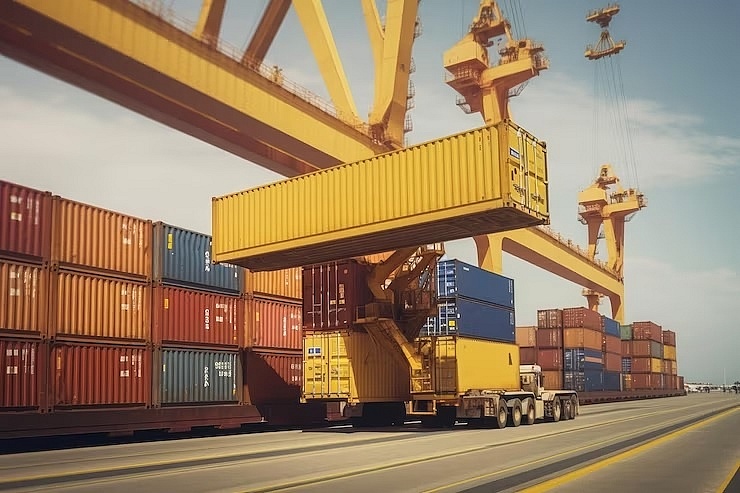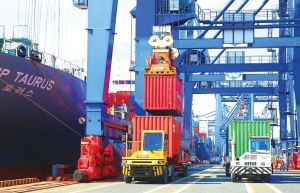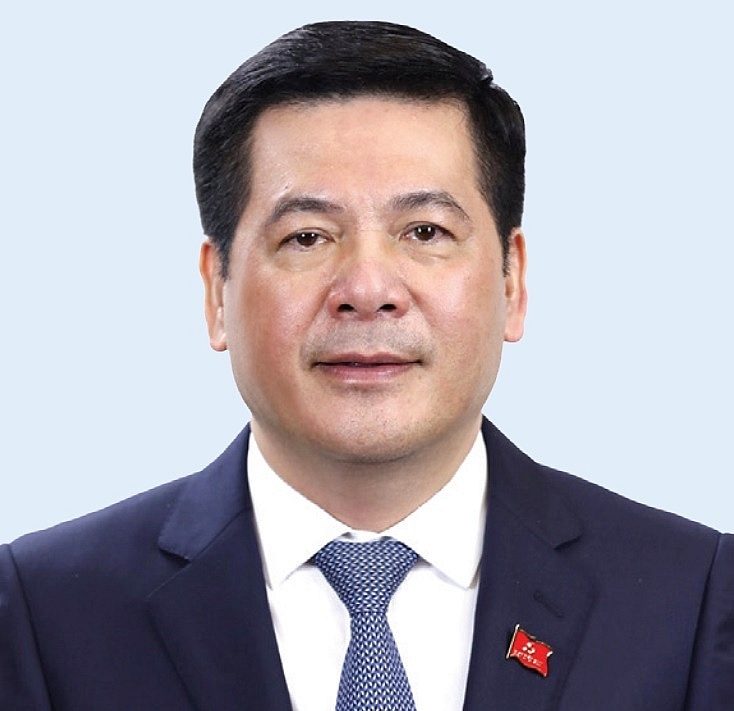Vietnam keen to explore more free trade advantages
The Ministry of Industry and Trade (MoIT) last week reported that Vietnam’s export landscape has been on an uptrend since last year’s Q3.
 |
| Vietnam keen to explore more free trade advantages, illustration photo/ Source: freepik.com |
The on-year export turnover in 2023 is estimated to stand at $355.5 billion, down 4.4 per cent on-year. However, the figure for December is estimated to reach $32.91 billion, up 13.1 per cent on-year, with Vietnamese exporters earning $9.44 billion – up 18.5 per cent and foreign companies fetching $23.47 billion – up 11.1 per cent.
In Q4, the on-year export value is estimated to sit at $96.5 billion, up 8.8 per cent on-year. The figure in Q3 was $94.6 billion, down slightly 1.2 per cent on-year, and an average of $82.2 in Q1 and Q2.
Fuelled by this uptrend, the MoIT has set a target that in 2024, the total export turnover will increase 6 per cent on-year, meaning a figure of $376.8 billion – with a trade surplus of $15 billion.
In 2023, the economy recorded a trade surplus of up to $28 billion, meaning Vietnam has achieved such an achievement for eight years in a row.
“Export activities have begun to see recovery signals since the remaining months of 2023. In 2024, together with the effective exploitation of existing free trade agreements (FTAs), the conclusion of negotiations of and implementation of deals with new markets such as Israel and the United Arab Emirates will provide more opportunities for us to boost trade and investment of Vietnam,” said the MoIT.
At present, the ministry is completing dossiers to submit to the government for approving the Vietnam-Israel FTA. Both nations will promulgate action programmes with concrete schemes on tariff reduction and removal under roadmaps.
The agreement aims to remove obstructions to most trade activities and to promote bilateral trade between Vietnam and Israel. Impediments can be in the form of tariffs, import quotas, other non-tariff barriers such as technical standards, and sanitary and phytosanitary standards.
“What is more, the fine political relationship strengthened and upgraded with major partners such as China, the US, and the EU will lay a firm foundation for amplifying Vietnam’s economic, trade, and investment ties,” the MoIT said.
The Vietnamese government in 2024 will continue seeking more opportunities for Vietnamese exports. It will boost the negotiations and signing of FTAs and deals on trade connectivity with new potential partners such as the Common Market of the South (Mercosur) to diversify markets and supply chains.
During an official visit to Brazil last October, Prime Minister Pham Minh Chinh emphasised that an FTA between Vietnam and Mercosur would “lead to breakthroughs in economic, trade and investment cooperation between the two countries, bringing substantial benefits to businesses and peoples of both sides”.
The Vietnamese leader also proposed that Vietnam and Mercosur – which comprises Brazil, Argentina, Uruguay, and Paraguay – would soon begin negotiations on the FTA.
The government will also continue supporting enterprises to take advantage of commitments in FTAs through providing consultancy on rules of origin and certificates.
Vietnam will also ensure the speed of negotiations on upgrading the ASEAN Trade in Goods Agreement, the ASEAN-Canada FTA, and a deal between Vietnam and the European Free Trade Association based on a principle of ensuring Vietnam’s benefits.
The MoIT will also combine with other ministries to study possibilities to negotiate FTAs with other potential partners such as Qatar, Turkey, South Africa, and Nigeria.
| Nguyen Hong Dien, minister of Industry and Trade
According to forecasts of international organisations, the problems of the global economy will persist in the coming years, continuing to adversely impact economies with large trade openness like Vietnam. Therefore, we need to continue to persistently implement the goals of international economic integration according to the Party’s policies and guidelines to more effectively take advantage of opportunities and advantages from FTAs in service of national economic development, at the same time anticipating and crafting solutions to overcome negative impacts from outside. In that context, in order to continue to exploit and effectively promote the advantages of bilateral and multilateral FTAs, ensuring the highest national interests and creating motivation for national development, it is necessary to continue to innovate and improve the quality of institutional work to gradually improve the legal and policy system, ensuring synchronisation and feasibility to fully implement Vietnam’s commitments to international economic integration. We need to make the most of the policy space that Vietnam is allowed in its commitments to create new advantages for the domestic business community to boost exports. We also need to create a basis for developing new industries of production and business, in accordance with the development trends of green economy, digital economy, circular economy, sharing economy, and Industry 4.0. At the same time, there should be a mechanism to encourage and bind foreign-invested enterprises to spread, share, and substantially support domestic enterprises (especially in production cooperation and supply of raw materials for production from on-site sources) in order to promote the development of management skills, technology transfer, formation of supply chains of raw materials and industry linkage clusters. This will contribute to improving competitiveness and capacity to participate in the global production and supply chains. In addition, it is necessary to focus on promoting in-depth, effective, and practical foreign economic relations associated with ensuring the highest national interests, especially economic relations with large and influential partners so as to create leverage for domestic economic and trade development. We will continue accelerating the progress of negotiations and signing of new cooperation mechanisms with countries and regions that still have great potential, such as the United Arab Emirates, the European Free Trade Association, and the Southern Common Market. This will help create motivation to strengthen trade and investment cooperation. Also, we need to continue strengthening implementation of commitments within the framework of FTAs that Vietnam has participated in. It is also needed to strengthen support for businesses to effectively respond to new barriers related to supply chains, clean materials, labour, environment, and carbon fee collection. |
 | Vietnam not letting up in free trade deal bonanzas Since its national establishment in September 1945 and the country’s opening doors to the world economy 37 years ago, Vietnam has reaped significant economic bonanzas from a large network of economic links, including free trade agreements. |
What the stars mean:
★ Poor ★ ★ Promising ★★★ Good ★★★★ Very good ★★★★★ Exceptional
Related Contents
Latest News
More News
- State corporations poised to drive 2026 growth (February 03, 2026 | 13:58)
- Why high-tech talent will define Vietnam’s growth (February 02, 2026 | 10:47)
- FMCG resilience amid varying storms (February 02, 2026 | 10:00)
- Customs reforms strengthen business confidence, support trade growth (February 01, 2026 | 08:20)
- Vietnam and US to launch sixth trade negotiation round (January 30, 2026 | 15:19)
- Digital publishing emerges as key growth driver in Vietnam (January 30, 2026 | 10:59)
- EVN signs key contract for Tri An hydropower expansion (January 30, 2026 | 10:57)
- Vietnam to lead trade growth in ASEAN (January 29, 2026 | 15:08)
- Carlsberg Vietnam delivers Lunar New Year support in central region (January 28, 2026 | 17:19)
- TikTok penalised $35,000 in Vietnam for consumer protection violations (January 28, 2026 | 17:15)


 Tag:
Tag:


















 Mobile Version
Mobile Version